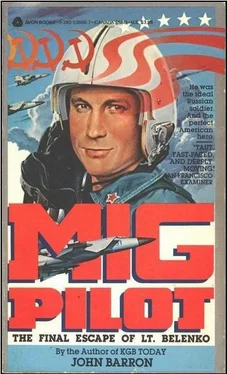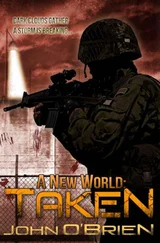“All squadron commanders report to my office. For today that is all. Dismissed.”
In the locker room Belenko changed into the dark-blue cotton flight suit issued him nineteen months before. It would be five more months before he was due to receive another, and he had tried to keep this one serviceable by neatly sewing patches on the knees and elbows. A duty officer unlocked the safe and handed him an automatic pistol and two clips of seven rounds each, for which he signed a receipt.
Sometime back a pilot had parachuted from a disabled plane into a remote wilderness, where he eventually died of privation and hunger. Hunters who came upon the skeleton many months later found a diary in which the pilot recorded his suffering and complained about the lack of any equipment that might have enabled him to survive in the wilderness. The last entry read, “Thank you, Party, for taking such good care of Soviet pilots.” Soon combat pilots were issued pistols, and their aircraft equipped with survival kits containing food, water, medicine, fishing gear, flares, matches, a mirror, and shark repellent. Newly armed, a pilot came home, found his wife in bed with a friend, and killed them both. Thereupon, in the interest of domestic tranquillity, the Party ordered the pistols recalled and kept locked up until just before flights.
During the next couple of hours briefing officers meticulously reviewed the flight plans. Planes from the squadron designated to fire missiles were to fly almost due eastward over the sea, where Navy ships would launch the target drones at which they would shoot. Belenko’s squadron would proceed to other exercise areas, practice intercept approaches, and then, relying solely on instruments, return to the base, and land. Because of the fine weather, many MiG-23s from adjacent bases probably would be in the air and perhaps also firing. Thus, it would be dangerous for any pilot to stray out of the zone to which Ground Control directed him.
Belenko sat motionless, maintaining a pose of respectful attentiveness while he contemplated his personal flight plan. His mind raced far away, computing times, distance, speed, fuel consumption, courses, points of probable intercept, evasive maneuvers, deceptions, and all exigencies he could imagine.
The fliers returned at eleven for a second breakfast of sausage, boiled eggs, white bread, butter, tea, and a chunk of chocolate, all again first tasted by a physician. Then a military truck hauled them over a bumpy, unpaved road to the Sakharovka Air Base two miles from squadron headquarters. Belenko presented himself in the hangar dispensary to the regimental physician for physical examination. The doctor protected the pilots as much as he could. They were forbidden to drink five days prior to flying; but everyone drank some, and many drank heavily. He ignored minor traces of alcohol, and if he judged the condition of a pilot hazardous in consequence of imbibing, he disqualified him for the day on other grounds — nasal congestion, slight ear infection, temperature; something that would soon pass.
He took Belenko’s temperature, pulse, and blood pressure, then examined his eyes, ears, and throat.
“How do you feel?” he asked.
“Excellent.”
“What kind of flight do you have today?”
“Routine exercise.”
The physician stopped talking and studied him carefully — skeptically, Belenko thought.
“Tell me, Lieutenant, have you drunk any alcohol in the past twenty-four hours?”
“No, not in the last five days,” Belenko answered truthfully.
“Do you think you are ready to fly your mission?”
“I am certain.”
“Well, your blood pressure is somewhat high. Nothing to be alarmed about, but for you, rather high. Is something troubling you?”
“Not at all.” Anticipating that the body might betray his tensions, Belenko had readied an explanation. “Comrade Doctor, if I don’t exercise, I feel like lumpy potatoes, and I’ve been cooped up for almost a week. This morning, when I saw the sun, I went out and ran like a deer, more than six kilometers. I’m probably still a little winded.”
The doctor nodded. “That could account for it. Good luck on your flight, Comrade Lieutenant.”
Belenko joined other pilots, who, pending the latest report from the meteorological officer, were standing around the hangar, joking about the forthcoming Communist Weekend. It was preposterous to cover the bunkers with sod. Obviously the Americans long ago had located and targeted the airfield. How could anyone think they would believe it suddenly was not there anymore? Someone said, “Besides, I heard that the cameras in their satellites can photograph a soldier’s boots from three hundred kilometers up.”
The conversation ceased, and the pilots edged off in different directions at the sight of Vladimir Stepanovich Volodin, the young KGB lieutenant assigned to the regiment. “Good morning, Viktor Ivanovich, how are you?”
“Very well.”
“And Ludmilla and Dmitri. How are they?”
“They are well also.”
“What’s new? What do you hear?”
“Well, the men rebelled again this morning, refused to eat breakfast.”
“Yes, I heard. What do you think the problem is?”
Answer him just as you regularly would.
“Vladimir Stepanovich, you know what the problem is as well as I do. Everybody knows.”
“I still would like to talk to you. Stop by this afternoon after your flight. Let’s talk.”
There was nothing at all unusual about this. The KGB officer naturally slinked around, asking, “What’s new? What do you hear?” Yet for a moment Belenko worried. Why did he come to me just now? Why did he ask me that? Well, so what? The bastard won’t be seeing me this afternoon, that’s for sure.
The meterological officers reported that to the east, where Belenko’s squadron would fly, the skies were fair and should remain so throughout the afternoon. However, to the southeast, where his actual objective lay, some cloud formations were gathering. A front might be moving in from Japan, but it was nothing to worry about this afternoon.
No! The forecast was clear everywhere. Idiots! How thick is it? Think of a reason to ask him. No, don’t. There is no reason. Careful. Show no concern. You’ll just have to take the chance.
From the supply room Belenko drew his flight helmet, oxygen mask, and gloves. “Comrade Lieutenant, you forgot your life preserver,” a sergeant called. Don’t take it. Fool them.
“Thanks. I won’t be over water today.”
Striding from the hangar, he saw the aircraft — twenty MiG-25s — poised wing to wing on the runway some 200 yards away. Weighing twenty-two tons, with twin tail fins, cantilevered tail planes, thick, short, swept-back wings, two enormous engines, and a long rocketlike nose ending with a radar needle, the MiG-25 reminded Belenko of a great steel bird of prey, dark gray and angry. Few weapons in the Soviet arsenal were more closely guarded from foreign observation, and even among themselves the Russians in official terminology simply referred to the MiG-25 as Product No. 84. A stripped-down model in 1967 set a world record by achieving a speed of 1,852 miles an hour, and another in 1973 eclipsed altitude records by soaring to 118,898 feet. Aging American F-4 Phantoms, though equipped with excellent missiles and flown by skilled pilots, had been unable to intercept or shoot down MiG-25s which occasionally streaked over the Mediterranean and the Middle East, taking photographs. No Westerner ever had been close to a MiG-25, and much about it was unknown. Nevertheless, the MiG-25 in the autumn of 1976 was the one plane most feared in the West. In 1973, U.S. Air Force Secretary Robert C. Seamans, a scientist with impressive aeronautical credentials, had characterized it as “probably the best interceptor in production in the world today.” While Defense Secretary, James R. Schlesinger had warned that the MiG-25 was so formidable that its widespread development and deployment would force fundamental changes in Western strategy and weaponry. More than 400 of the interceptors had already been deployed. They embodied the most advanced aeronautical technology and, in a sense, the national pride of the Soviet Union. The comparatively few young men chosen, trained, and entrusted to fly them represented an acknowledged and honored elite in the Soviet armed forces.
Читать дальше












